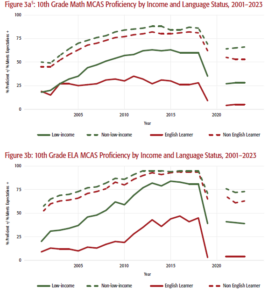Pioneer Institute Study Finds MCAS, Education Reform Have Significantly Improved Academic Attainment
Gains have been particularly notable among low-income, Black and Hispanic students
BOSTON – Reforms included in the 1993 Education Reform Act, including the MCAS graduation requirement that was at the heart of the legislation, have yielded improved academic attainment in Massachusetts, especially among historically underserved students, according to a new study published by Pioneer Institute.
“The period following passage of the Education Reform Act until the COVID pandemic was one of broad and steady progress for Massachusetts students,” said Dr. Kerry L. Donahue, author of “From MCAS to College: Educational Milestones and Postsecondary Success in Massachusetts.”
Dr. Donahue addresses three key areas. First, from 2001 (when MCAS was first administered) until 2018, the scores of Massachusetts students improved significantly, and the progress was especially notable for low-income Black and Hispanic students.
The second area was college readiness. There, more Black, Hispanic, low-income students and English learners completed advanced coursework such as Advanced Placement(AP), Early College and Dual Enrollment. More took the SATs, their scores were better, and high school graduation rates were higher than before reform.
Finally, Donahue looked at post-secondary outcomes. She found that both college enrollment and degree attainment increased. The gains occurred as the student population became more racially, ethnically, linguistically and socio-economically diverse. Over 3,800 more low-income students from the class of 2014 earned postsecondary degrees compared to the class of 2006, reflecting gains over and above their increases in enrollment in Massachusetts schools.
Since 2019, the introduction of the Next Generation MCAS and the pandemic in particular have widened achievement gaps on standardized assessments, that prior research has shown to be predictive of postsecondary success.
The progress in postsecondary attainment is particularly important for Massachusetts. National estimates are that 85 percent of good jobs in 2031 will require postsecondary degrees or certifications. The percentage will likely be even higher in a state like Massachusetts which is a hub for fields such as artificial intelligence, biotechnology and life sciences, and green energy innovation.
“The study by Dr. Donahue and published by Pioneer shows that MCAS has improved the educational outcomes across socioeconomic backgrounds since 2006,” said Jamie Gass, Director of the Center for School Reform at Pioneer Institute. “This is an imperative finding because it shows that postsecondary attainment chances increased for all Massachusetts K-12 students, regardless of their zip code or background.”
See the full study at https://pioneerinstitute.org/
About Dr. Kerry Donahue
Dr. Kerry L. Donahue is a seasoned education consultant, researcher, and policy expert with over 15 years of experience in public education. Beginning her career as a high school teacher, Dr. Donahue has held leadership positions at the Boston Schools Fund, NewSchools Venture Fund, and the District of Columbia Public Schools. Throughout her career, she has spearheaded numerous state and local initiatives aimed at expanding access to high-quality education. As a trusted advisor to state policymakers, she has provided expertise on key issues such as accountability, high school redesign, charter schools, educator pipelines, and instructional materials. Dr. Donahue holds a B.A. in Political Science from the College of the Holy Cross, an M.P.P. from Georgetown University, and a Doctorate. in Education Leadership from Harvard University.
About Pioneer Institute
Pioneer Institute is a non-partisan think tank based in Boston. It develops and communicates dynamic ideas that advance prosperity and a vibrant civic life in Massachusetts and beyond.





